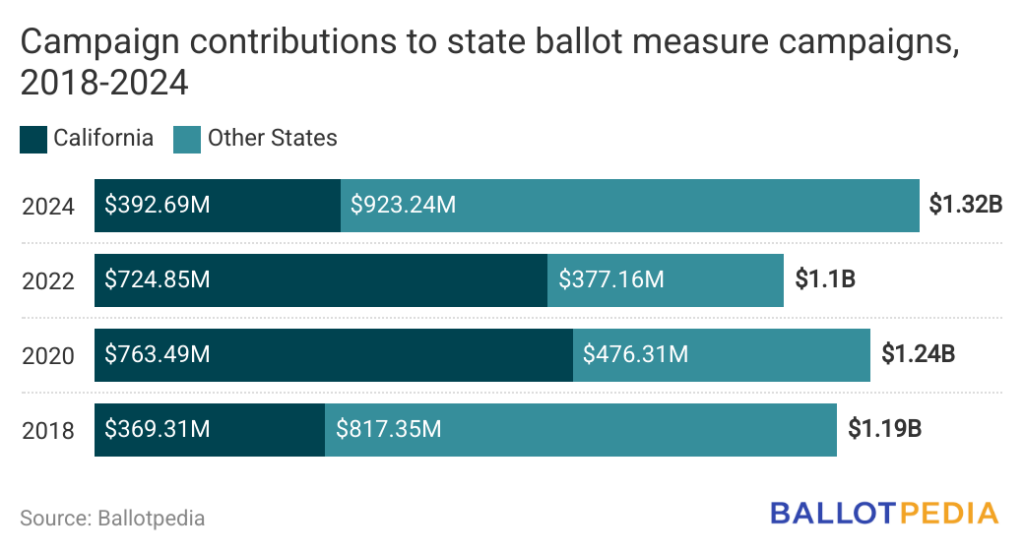In 2024, campaigns supporting and opposing the 159 ballot measures that appeared on statewide ballots received more than $1.3 billion in contributions—more than each of the last three even-year election cycles.
Campaigns in 2020 raised the second-highest amount ($1.2 billion) despite having the fewest number of ballot measures—129.

Campaigns behind the 11 measures in California in 2024 raised nearly $392.7 million—just under a third of the 2024 total. In 2022 and 2020, California accounted for 65.9% and 61.6% of each year’s total contributions nationwide, respectively. The next four states with the most contributions in 2024 were:
- Florida, where six measures were on the ballot, at $315.4 million or 24.3% of the cumulative total.
- Missouri, where eight measures were on the ballot, at $108.4 million or 8.2% of the cumulative total.
- Washington, where four measures were on the ballot, at $57.6 million or 4.4% of the cumulative total.
- Arizona, where 13 measures were on the ballot, at $54.8 million or 4.2% of the cumulative total.
In 2022, the top three states were California (65.8%), Michigan (9.3%), and Massachusetts (6.5%). In 2020, the top three states were California (61.6%), Illinois (10.0%), and Massachusetts (5.0%).
Among the Florida measures is the most expensive of the year—Amendment 3. Amendment 3, which was defeated, would have legalized recreational marijuana. Campaigns supporting the initiative raised $153.8 million, four times more than the opposition, which raised $33.6 million. Trulieve, a marijuana dispensary company, was the largest donor to the support campaign, contributing $144.6 million. Kenneth Griffin, the CEO of Citadel, was the top donor to the opposition campaign contributing $12 million.
The second most expensive measure in 2024 was California Proposition 33. Support campaigns raised $50.7 million, while the opposition raised $125.1 million. Proposition 33 was also defeated. It would have allowed cities and counties to limit rent on housing. It was the third time supporters had sponsored the initiative after similar versions were previously defeated in 2018 and 2020. The PACs supporting and opposing those initiatives raised a combined total of $221.1 million across both election cycles. The AIDS Healthcare Foundation was the primary sponsor behind all three campaigns. In 2024, it contributed nearly $50 million to sponsor the initiative. The top donor to the opposition campaign was the California Apartment Association with $88.8 million. Proposition 33 is the third most expensive measure in California since 1999, behind Proposition 22 ($224.2 million) in 2020 and Propositions 26 and 27 ($463.4 million) in 2022.
Abortion-related ballot measures were a notable trend in 2024. On Nov. 5, voters decided on 11 abortion-related ballot measures—the most on record for a single year. Of the 11, Florida Amendment 4 was the most expensive measure with $135.2 million raised by both sides. Amendment 4 was defeated. It would have provided a state constitutional right to abortion before fetal viability. Amendment 4 surpassed last year's Ohio Issue 1, which provided for a state constitutional right to abortion, and saw $89.9 million between supporters and opponents.
Ten addressed state constitutional rights to abortion, and one proposed limiting the timeframe for when an abortion can be performed. Support campaigns for the 10 measures that addressed constitutional abortion rights raised $256.5 million in contributions, while opponents raised $32.5 million. Supporters of the measure in Nebraska that limited the timeframe raised $12.7 million, while opponents raised $15.9 million.
Six statewide ballot measures related to ranked-choice voting were up for election on Nov. 5. Four measures in Colorado, Idaho, Nevada, and Oregon would have enacted ranked-choice voting, but they were all defeated. One measure in Alaska would have repealed RCV in the state, but it was defeated. Another measure in Missouri prohibited the use of ranked-choice voting. It was approved. Supporters of RCV raised $76.7 million in 2024. RCV opponents raised $4.5 million.
All 57 citizen-initiated measures had at least one campaign supporting or opposing the measure, while only 27 of the 102 legislatively referred measures had at least one funded campaign.
The three donors with contributions spanning the most ballot measures were The Fairness Project, which contributed $24.8 million across nine measures; Sixteen Thirty Fund, which contributed at least $22.2 million across nine campaigns; and National Education Association, which contributed $17.6 million across nine campaigns.
The largest individual donor was Trulieve, which expended $144.6 million to support Florida Amendment 3. The next largest donors were the California Apartment Association ($133.3 million) and AIDS Healthcare Foundation ($66.2 million), which were involved with California Proposition 33 and Proposition 34.


